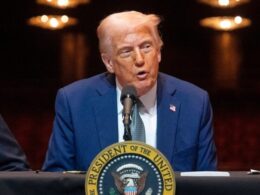Unlock the White House Watch newsletter for free
Your guide to what the 2024 US election means for Washington and the world
When it began, 2024 was gloomily predicted to be a year when the very future of democracy would be in question. How has it fared? In many countries it has been an inspiring year for the democratic spirit. More people have voted in multi-party elections this year than ever before. There has been a rout of complacent incumbents. Sitting governments have been shaken or ousted around the world from India to South Africa, Britain to Botswana to France. Authoritarian systems, such as Venezuela’s — and Turkey’s, via local elections — have been given an unexpected kicking by opponents, even if in both these cases the ruling parties were not actually defeated.
Yet this has also been a year in which the very idea and systems of democracy have been tested as seldom before. Autocracies such as Russia and Rwanda have held travesties of elections to rubber-stamp effective one-party rule. In relatively young democracies it has become clear that the holding of multi-party elections, hailed after the fall of the Berlin Wall as a litmus test of freedom, is not enough in itself for pluralism to endure. The strength of institutions is essential for its long-term prospects. Mexico held an undisputed election, but the new president is now busily undermining the judiciary. Indonesia, too, held a fair election but its new leader’s commitment to democratic freedoms is open to question.
All the while, advances in technology have opened up fresh avenues for unscrupulous actors to disseminate crude propaganda — and manipulate results. In Romania, the authorities ended up annulling the first round of its presidential election over concerns Russia had exerted undue influence, as it had tried to do in neighbouring Moldova too. The most powerful democracy of all, America, which has so long liked to see itself as a champion of political freedoms, has elected as president a man whose record and domestic agenda pose grave threats to democratic institutions. They will indeed undermine America’s already tattered pretensions to be a beacon of liberty.
When arguing for democracy as the best way to hold rulers to account, idealists like to cite its glory years in classical Athens. But that fabled period soon gave way to oligarchy, autocracy or mob rule. As Plato observed, democracy is all too fragile. “A charming form of government,” he wrote, “full of variety and disorder.” He ultimately had a dim view of its long-term prospects: “Dictatorship naturally arises out of democracy.”
Beyond America, other nationalist populists have fared well at the ballot box. But globally democrats do have more reasons to celebrate than they might have anticipated 12 months ago. Despots have been reminded that they can be overthrown at extraordinary speed. Sheikh Hasina in Bangladesh and the totalitarian Bashar al-Assad in Syria both had to flee. The lessons will hopefully not be lost on other strongmen.
Some elections, such as America’s, have yielded results this newspaper did not favour. But that is how democracy works. It is up to Donald Trump’s opponents to hold him up to scrutiny and make their case to the electorate for a change in four years.
For an uplifting reminder of what democracy can yet achieve, look at Taiwan’s ferment of political parties and ideas; or South Africa. A year ago it was spiralling ever further into a morass of dysfunction and graft under the African National Congress. Now the ANC is in coalition and South Africa’s investment and political climate is the most favourable in decades.
The battle for democracy will remain hard-fought. But despite all the obstacles, it still often finds a way to triumph. Plato was too bleak. We should not despair.
Source link









